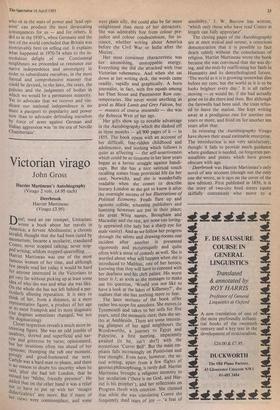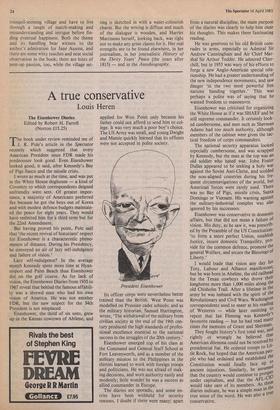Victorian virago
John Gross
Harriet Martineau's Autobiography (Virago 2 vols. £4.95 each) Deerbrook Harriet Martineau (Virago £3.95)
Deaf; used an ear trumpet, Unitarian; wrote a book about her travels in America; a fervent Abolitionist; a chronic invalid; thought that she had been cured by Mesmerism; became a secularist; translated Comte; never stopped talking; never stop- ped writing; seldom stopped quarrelling ... Harriet Martineau was one of the most famous Women of her time, and although few people read her today it would be hard for anyone interested in the Victorians to get very far without picking up at least some idea of who she was and what she was like. On the whole she has not left behind a par- ticularly alluring reputation. It is easy to think of her, from a distance, as a mere representative figure, a product of her age at its most frumpish and its most dogmatic (the dogmas sometimes changed, but not the dogmatizing).
Closer inspection reveals a much more in- teresting figure. She was an odd jumble of
qualities, shrewd and superficial and nar- row
and generous by turns; opinionated,
but her intuitions often ran ahead of her °Pinions; thumping the tub one moment, 813ssiPY and good-humoured the next. Carlyle was a hard man to please, and there Is no reason to doubt his sincerity when he said, after she had left London, that he missed her 'blithe, friendly presence'. He added that on the other hand it was a relief nOt to have to put up with her 'meagre .chdacticalities' any more. But if many of her views were commonplace, and some were plain silly, she could also be far more enlightened than most of her detractors. She was admirably free from colour pre- judice and colour condescension, for in- stance, whether writing about America before the Civil War or India after the Mutiny.
Her most consistent characteristic was her astonishing, unstoppable energy. Everything she did she attacked with true Victorian vehemence. And when she sat down at her writing desk, the words came readily, rapidly and graphically. A born journalist, in fact, with few equals among her Fleet Street and Paternoster Row con- temporaries. She never wrote anything as good as Black Lamb and Grey Falcon, but — mutatis of course mutandis — she was the Rebecca West of her age.
Her gifts show up to notable advantage in the Autobiography which she dashed off in three months — all 900 pages of it — in 1855. The book opens with an account of her difficult, fear-ridden childhood and adolescence, and nothing which follows is quite as affecting — the self-assertiveness which could be so tiresome in her later years began as a heroic struggle against handi- caps. But she has a nice satirical touch recalling scenes from provincial life (in her case, Norwich), and she is wonderfully readable when she comes to describe literary London as she got to know it after the overnight success of her Illustrations of Political Economy. Feuds flare up and egoisms collide; scheming publishers and lionizing hostesses are put in their place; the great Whig names, Brougham and Macaulay and the rest, are none too loving- ly appraised (the lady has a sharp eye for male vanity). And as we follow her progress through the salons and drawing-rooms one incident after another is presented vigorously and picturesquely and quite often with a sense of comedy as well. She is worried about what will happen when she is introduced to Malthus, one of her heroes, knowing that they will have to contend with her deafness and his cleft palate. His worst letter is I; as soon as she manages to make out his question, 'Would you not like to have a look at the lakes of Killarney?', she realises that she has nothing more to fear. The later sections of the book offer rather less scope for anecdote. She moves to Tynemouth and takes to her sofa for live years, until the mesmeric cure; then she set- tles at Ambleside. There are some interest- ing glimpses of her aged neighbours the Wordsworths, ajourney to Egypt and Palestine, a first meeting, impatiently awaited (is he, isn't she?) with the mysterious 'Currer Bell'. But the main em- phasis falls increasingly on Positivism and free thought. Even here,
however, the ac- tual writing, apart from a few flights of gaseous philosophising, is rarely dull. Harriet Martineau brought a religious intensity to her secularism ('there is no God, and Har- riet is his prophet), and her reflections on Progress throb with emotion. She claimed that while she was translating Comte she frequently shed tears of joy — 'a feat of sensibility,' J. W. Burrow has written, 'which only those who have read Comte at length can fully appreciate'.
The closing pages of the Autobiography are at once stoical and serene, a conscious demonstration that it is possible to face death calmly without the consolations of religion. Harriet Martineau wrote the book because she was convinced that she was dy- ing, and she ends by reaffirming her faith in Humanity and its demythologized future. 'The world as it is is growing somewhat dim before my eyes; but the world as it is to be looks brighter every day.' It is all rather moving — or would be, if she had actually gone on to die there and then. But although the farewells had been said, the train refus- ed to leave the station. She kept writing away at a prodigious fate for another ten years or more, and lived on for another ten years after that.
In reissuing the Autobiography Virago have shown their usual estimable enterprise. The introduction is not very satisfactory, though: it fails to provide much guidance where guidance is needed, on forgotten per- sonalities and points which have grown obscure with age.
Deerbrook was Harriet Martineau's only novel of any account (though not the only one she wrote, as it says on the cover of the new edition). First published in 1839, it is the story of two-city bred sisters (quite skilfully contrasted) who move to a
tranquil-seeming village and have to live through a tangle of match-making and misunderstanding and intrigue before fin- ding eventual happiness. Both the theme and its handling bear witness to the author's admiration for Jane Austen, and there are some witty touches and neat social observation in the book; there are hints of pent-up passion, too, while the village set-
ting is sketched in with a water-colourish charm. But the writing is diffuse and much of the dialogue is wooden, and Harriet Martineau herself, looking back, was right not to make any great claims for it. Her real strengths are to be found elsewhere, in her journalism, in her journalistic History of the Thrity Years' Peace (the years after 1815) — and in the Autobiography.











































 Previous page
Previous page